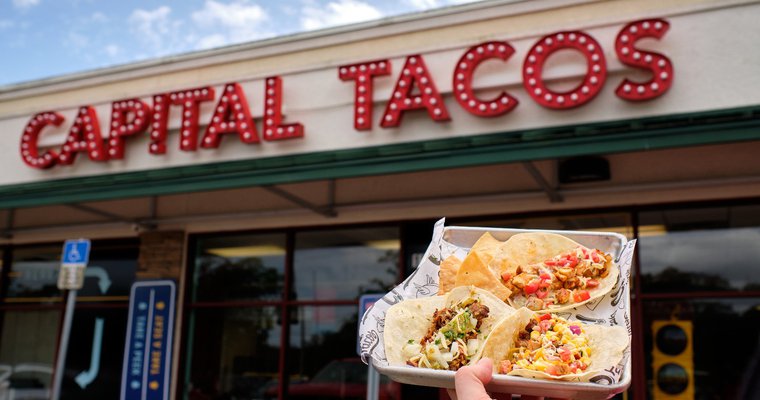Tampa-based Capital Tacos is ready to franchise.
Although the company was founded in 2013 in a 1,000-square-foot signless storefront, the business has grown to five locations. It features a huge menu, including 13 tacos as well as burritos and bowls, said Josh Luger, an operating partner and co-owner focused on expanding the chain in Florida, Georgia, South Carolina, North Carolina, Tennessee, Arkansas, Alabama, Missouri and Louisiana.
“There’s really nothing like Capital Tacos in the franchise world. In fact, there’s nothing like Capital Tacos, period,” he said in a company press release. “We’ve long been recognized as one of the best Tex-Mex concepts in the country, and now we’re leveraging that position to help franchise partners find the same success in their home markets that we’ve found in Florida.”
Luger and James Marcus, operating partner and co-owner, believe franchisee candidates are likely to come from their employees and have rolled out financial support to accommodate employees who wouldn’t otherwise be able to raise the investment capital.
“We want great operators who will be spending their time in the store,” Luger said. “Our employees already have a working knowledge of the operations and a passion for the brand, so they are prime candidates. But we’ve deliberately kept our initial investment low, and we’ll be rolling out a number of financial support options to help under-capitalized candidates who are otherwise qualified to get on board.”
The chain, of course, is also looking outside its own walls for franchisee candidates. Startup costs range from $195,000 to $382,000, including a $30,000 franchise fee.
“We believe that owning a Capital Tacos is a truly unique opportunity that can forever transform the financial lives of franchisees and their families, and nothing is more soul-filling and enriching than to be part of that,” Luger said. “Franchisees will be supported by an “expert team of marketing and franchise specialists — people who are every bit as devoted to the success of our franchisees as we are.”
Although each store is a little different, they have a few things in common, including retro pinball machines and an area where families create life-size chalk drawings together on 100-foot chalk walls. The stores also feature funky murals made entirely out of bottle caps (collected by each store from the sodas it sells) and chairs hanging from the bathroom walls as lamp holders, an homage to the original store “hack” to get some lights going in the bathroom there, Marcus said.
“Keeping true to our roots and where we came from — and embracing our eccentricities and differences rather than running from them — is simply who we are,” he said. “Our customers appreciate that we are for everyone, and we are like everyone. Our guests know what they get from us: authenticity. What you see at Capital is what you get.”
Why now?
Luger said the company has received hundreds of requests over the years about franchising, but he and Marcus weren’t ready to pull the trigger until now.
“We’ve spent years with our heads down building out and bulletproofing the concept before going back to these folks — as we are now — saying ‘Yes, you can’ and ‘Here’s how,'” he said. “And the timing to do so is better than ever.”
That bulletproof plans include a tech stack featuring a combination of third-party platforms driving its loyalty program (Punchh), as well as its direct online ordering (Olo), and mobile app (Koala), while other internal-facing systems enable its store managers to run a clean, safe and efficient location, Marcus said.
Capital Tacos also has one of the “industry’s most advanced proprietary, custom-built kitchen display systems — one that took years to design and build, and that is fully customized to its specific operations and menu,” Marcus said.
“Thanks to our unique offerings and our investment in technology, the convenience and value we are able to offer guests in search of great food is through the roof,” Luger said. “We’ve seen a measurable and meaningful uptick in overall and repeat business by offering customers a best-in-class digital experience, along with the ability to fully customize their order, order and reorder conveniently when and where they want, and seamlessly get rewarded and surprised with exclusives through Capital Rewards.”

